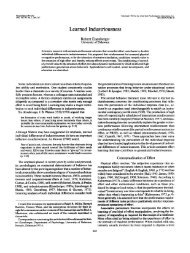Perceived Organizational Support
Perceived Organizational Support
Perceived Organizational Support
You also want an ePaper? Increase the reach of your titles
YUMPU automatically turns print PDFs into web optimized ePapers that Google loves.
Coyle-ch10.qxd 1/16/04 3:00 PM Page 212<br />
212 Exchange Nature of Employment Relationship<br />
found that employees who reported strong mutual obligations between themselves and<br />
their organization had higher levels of POS than employees who reported low mutual<br />
obligations between themselves and their work organization.<br />
10.4 Psychological outcomes of POS<br />
POS was originally assumed to create a felt obligation to help the organization reach<br />
its goals, increase affective commitment to the organization, and strengthen<br />
performance–reward expectancies (Eisenberger et al. 1986). More recently, attention<br />
has been given to the role of POS in reducing aversive psychological and psychosomatic<br />
reactions to stressors by indicating the availability of material aid and emotional<br />
support when needed to face high demands at work (George et al. 1993; Robblee<br />
1998). Below we consider the conceptual basis for these outcomes of POS, together<br />
with supporting evidence.<br />
10.4.1 Felt obligation<br />
When one person treats another well, the norm of reciprocity obliges the return of<br />
favorable treatment (Gouldner 1960). The reciprocity norm may also apply to<br />
employee–employer relationships, compelling employees to recompense advantageous<br />
treatment they receive from their work organization (see Chapter 1). Because POS<br />
provides a broad and valued set of socio-emotional and impersonal resources to<br />
employees, the norm of reciprocity should, in turn, produce a general felt obligation to<br />
help the organization achieve its goals (Eisenberger et al. 1986; Shore and Shore 1995).<br />
In accord with OST, Eisenberger et al. (2001) found a positive relationship between<br />
postal employees’ POS and a general felt obligation to help the organization. <strong>Support</strong>ing<br />
the notion that reciprocity is involved in this process, the relationship between POS and<br />
felt obligation increased with employees’ exchange ideology, which is the endorsement<br />
of the reciprocity norm as applied to the employee–employer relationship.<br />
10.4.2 Affective organizational commitment<br />
OST holds that POS fosters affective organizational commitment by meeting<br />
employees’ socio-emotional needs, such as the needs for esteem, approval, and emotional<br />
support (Eisenberger et al. 1986; Armeli et al. 1998). The fulfillment of these<br />
needs should facilitate the incorporation of employees’ organizational membership<br />
and role status into their social identity, thereby creating a strong emotional attachment<br />
to the organization. A longitudinal panel study found that while POS was<br />
related to temporal changes in affective commitment, affective commitment was<br />
unrelated to temporal changes in POS (Rhoades et al. 2001). Also, the obligation that<br />
arises because employees feel the need to reciprocate the support they receive should<br />
also lead to affective commitment to the organization (Rhoades et al. 2001). Thus,<br />
Eisenberger et al. (2001) found that felt obligation mediated the relationship between<br />
POS and affective commitment.



